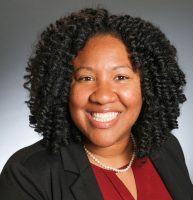Sidibe relies on collaboration, flexibility and speed to direct CDC Foundation’s COVID-19 response
September 18, 2020

Turquoise Sidibe
As emergency response director for the CDC Foundation, Gillings Department of Health Behavior alumna Turquoise Sidibe, MPH, has tackled everything from hurricanes to the opioid crisis. A focus on core principles has guided her response to the rapidly shifting landscape of the COVID-19 pandemic. Since her unit was activated in January 2020, she has led implementation and evaluation of the CDC Foundation’s more than 100 active COVID-19 projects.
The U.S. Congress created the CDC Foundation as an independent nonprofit that channels philanthropic and private-sector resources to support the health-protection work of the U.S. Centers for Disease Control and Prevention (CDC). The CDC Foundation both supports CDC projects and manages its own international and domestic projects that advance the work and mission of the CDC. To date, the CDC Foundation has raised more than $900 million to support the agency. The CDC Foundation leverages its partnerships and dynamic and flexible processes to manage, fund and evaluate projects and collaborates with CDC for subject matter expertise. The CDC Foundation’s flexibility and speed to respond to national emergencies and global pandemics has been critical to Sidibe as she leads the organization’s emergency response efforts.
Other unique demands of the pandemic involve its role in highlighting health equity and systemic injustice and racism. Sidibe says that issues of access to and quality of care, and the social determinants of health that harm some communities disproportionately, have always been a focus for her, but that the pandemic brought them to the forefront.
“My unit has a strong history of bringing a health equity lens into emergency response,” said Sidibe. “The pandemic has increased awareness of this need, and there is a specific emphasis from CDC on making sure projects are equity focused. We’re funding entire projects that are primarily health-equity projects. As someone who identifies as Black, it’s important to me, and it’s important to my team, to be sure we’re making an impact in the communities with the most need, and this includes needs related to language and disability.”
As an example, she mentions a project with Howard University and the University of California, Los Angeles. Currently in the planning phase, the project hopes to examine social stigma and resilience related to COVID-19 among Asian American, Black, Latinx, LGBTQIA and immigrant communities to learn what kind of stigma comes with testing positive or having a family member test positive for COVID-19, and will look for ways to foster a healthy support system for these groups. It will also explore innovative ways to track information about resilience, without relying on hospital data, to get more accurate information more quickly. This will not only increase the effectiveness of this program; it has the potential to create a new model for future projects to collect information on groups that are often underrepresented in existing data.
When asked about the unique challenges of responding to the pandemic, Sidibe says that the intense collaborations her work requires, which often must be formed rapidly, were previously aided by meeting in person. She notes that, because different cultures place greater value on face-to-face interaction, these meetings had been particularly important in international projects. Now concerns for safety severely limit travel.
The relentless pace of the pandemic has presented another challenge.
“It’s been a nonstop emergency,” she said. “Flexibility is the name of the game. Usually, we’re able to have a plan and execute, but during the pandemic, we have to keep changing our approach based on new data and research to try to make sure we’re supporting public health in the most equitable and effective way.”
When asked how her time at Gillings prepared her for the challenges she faces, Sidibe praises the focus on incorporating diverse voices.
“You learn that public health is a team sport,” she said. “During the pandemic we have to rely on so many different teams and organizations to reach a common goal, and Gillings prepared me for that. We learned to come to an agreement quickly while considering different people’s perspectives, and we learned to think about public health based on how it affects different groups. This has really helped my ability to lead my team and implement programs.”
As an example of previous disaster relief work, Sidibe’s team shored up and restarted critical public health infrastructure in Puerto Rico and the U.S. Virgin Islands after the devastating 2017 hurricane season that included Hurricanes Harvey, Irma and Maria. Her team began a vaccination campaign, helped connect displaced people with medical care, provided laboratory support and equipment for the Puerto Rico Department of Health, engaged in a campaign to inform the public of health risks, facilitated health department staffing, and provided insect repellent.
Reflecting on her education and career, Sidibe had a message for current and prospective students.
“I never thought I would be an emergency response director,” she said. “You can really find your own niche. Students should know that many things link back to public health. It’s a broad field, and there’s a place for public health in any job arena.”
Contact the UNC Gillings School of Global Public Health communications team at sphcomms@unc.edu.
